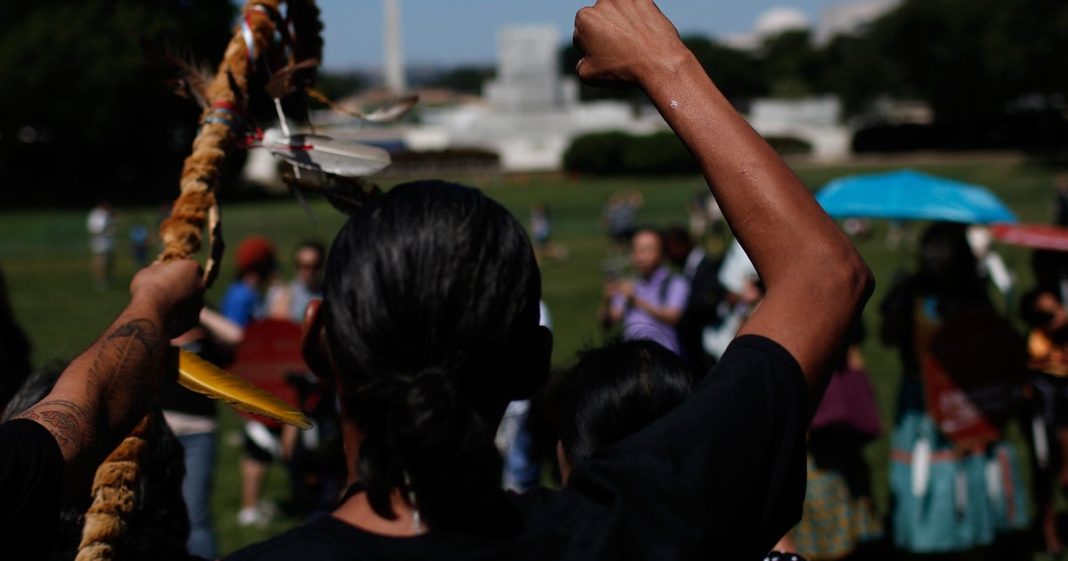Washington — The Supreme Court on Tuesday turned away a challenge from Native Americans seeking to block a copper mining project on government-owned land in Arizona that will destroy a sacred site used to perform religious ceremonies.
The court rejected an appeal from the nonprofit organization Apache Stronghold, which challenged the transfer of the site known as Oak Flat to the mining company Resolution Copper. In turning away the case, the high court left in place a lower court ruling that allowed the land, located in Tonto National Forest, to be transferred for the development of the copper mine.
Justices Neil Gorsuch and Clarence Thomas dissented from the Supreme Court’s denial of the appeal. Justice Samuel Alito did not participate in the court’s consideration of the case.
Gorsuch, joined by Thomas, called the Supreme Court’s decision not to hear the challenge a “grave mistake” and said the lower court’s decision is an “outlier.”
“While this court enjoys the power to choose which cases it will hear, its decision to shuffle this case off our docket without a full airing is a grievous mistake — one with consequences that threaten to reverberate for generations,” Gorsuch wrote. “Just imagine if the government sought to demolish a historic cathedral on so questionable a chain of legal reasoning. I have no doubt that we would find that case worth our time. Faced with the government’s plan to destroy an ancient site of tribal worship, we owe the Apaches no less.”
The federal government had for more than a century recognized Oak Flat’s significance and protected the land, as well as the Apaches’ access to it. The site includes old-growth oak groves, sacred springs and burial locations, according to court filings, and the Apaches consider Oak Flat to be “a unique dwelling place of spiritual beings called Ga’an.”
But that changed after a copper deposit was discovered under the site in 1995. Seeking to obtain the deposit, two mining companies, Rio Tinto and BHP, created a joint venture called Resolution Copper.
From 2005 to 2013, Resolution Copper’s backers in Congress introduced legislation to transfer Oak Flat to the company, though the efforts were not successful. Then, in 2014, a land-transfer bill was included in a must-pass defense package, which authorized the transfer of roughly 2,422 acres including Oak Flat to Resolution Copper in exchange for other parcels of land.
The legislation revoked prior presidential orders that protected Oak Flat from mining and directed the secretary of Agriculture to prepare an environmental impact statement for the project. That environmental impact statement, published in January 2021, confirmed that the copper mine would “directly and permanently” damage Oak Flat. To extract the copper, the company plans to use a technique called panel carving, which Apache Stronghold said would turn the site into a crater that is roughly 1,000 feet deep and nearly two miles wide.
While the original environmental impact statement was withdrawn shortly after it was issued, the Trump administration has said that it plans to publish a final version next month and move forward with the land transfer to Resolution Copper.
In an attempt to stop the exchange and subsequent destruction of Oak Flat, Apache Stronghold, which represents members of the San Carlos Apache Tribe, filed a lawsuit in 2021, arguing that the move violates the Religious Freedom Restoration Act and Free Exercise Clause of the First Amendment.
A federal district court declined to block the land transfer, and a divided U.S. Court of Appeals for the 9th Circuit ultimately rejected Apache Stronghold’s challenge, finding that the copper mining project did not impose a substantial burden on the tribes’ religious exercise.
The Forest Service has estimated that the project will create 3,500 jobs and contribute $1.2 billion to Arizona’s economy each year. But lawyers for the San Carlos Apache Tribe, which worships at the site, said in court papers that Oak Flat “is central to traditional Apache religion as the home of Apache deities and the only place where Apaches can practice unique ceremonies.”
Vicky Peacey, general manager of Resolution Copper, said the mine is “vital to securing America’s energy future, infrastructure needs, and national defense with a domestic supply of copper and other critical minerals.”
“More than a decade of extensive consultation and collaboration with Native American Tribes and local communities has directly led to major changes to the mining plan to preserve and reduce potential impacts on Tribal, social, and cultural interests, and this ongoing dialogue will continue to shape the project,” she said in a statement.
Wendsler Nosie Sr. of Apache Stronghold called the Supreme Court’s decision a “heavy blow” and urged Congress to act to stop the land transfer.
“We will never stop fighting — nothing will deter us from protecting Oak Flat from destruction,” he said in a statement.
The Supreme Court considered for months whether to take up Apache Stronghold’s appeal, discussing the case at more than a dozen closed-door conferences.




